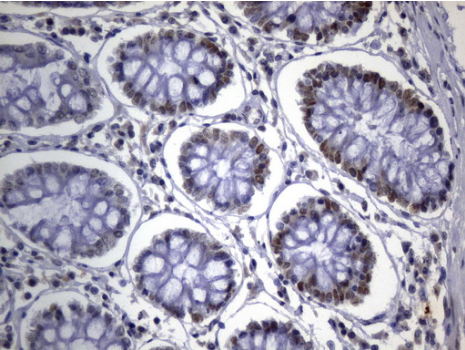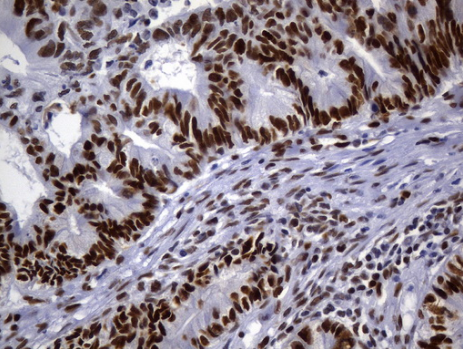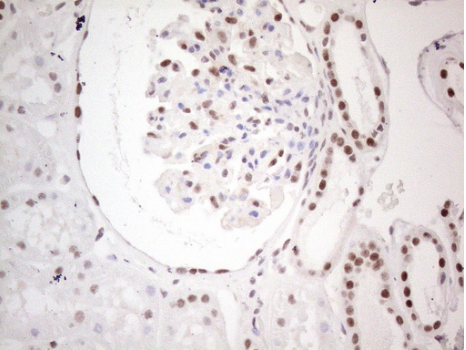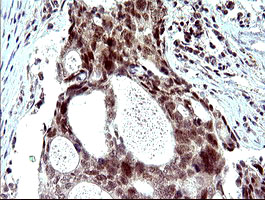Colorectal Cancer
Colorectal Cancer (CRC), more frequently detected in western countries, is caused by mutations in target oncogenes, tumor suppressor genes and genes related to DNA repair mechanisms. CRC is classified into 3 types depending on the origin of the mutation: Sporadic (70%), inherited (5%) and familial (25%)[1].
Colorectal cancer antibody sampler panel- customizable
Sporadic cancer: These cancers are derived from point mutations and account for 70% of CRC. The occurrence of mutations follow a specific sequence which is followed by a morphological sequence.Immunohistochemical staining of paraffin-embedded Human colon tissue within the normal limits using anti-MSH2 mouse monoclonal antibody. (Heat-induced epitope retrieval by 1mM EDTA in 10mM Tris buffer (pH8.0) at 120?C for 2.5 min,?UM800149) (1:2400)
Immunohistochemical staining of paraffin-embedded human colon adenocarcinoma tissue using anti-MSH6 mouse monoclonal antibody. (Heat-induced epitope retrieval by 1mM EDTA in 10mM Tris buffer (pH9.0) at 120?C for 3min,?UM800148) (1:50)
Immunohistochemical staining of paraffin-embedded Human Kidney tissue using anti-MLH1 mouse monoclonal antibody. (Heat-induced epitope retrieval by 1mM EDTA in 10mM Tris buffer (pH8.0) at 110?C for 10min,?UM800083) (1:200)
Immunohistochemical staining of paraffin-embedded Adenocarcinoma of Human breast tissue using anti-PMS2 mouse monoclonal antibody. (Heat-induced epitope retrieval by 10mM citric buffer, pH6.0, 120?C for 3min, TA506658)
Key genes mutated in Sporadic CRC
APC KRAS TP53 DCC SMAD4 BRAF| Mutant ORF clones |
Ultra-Specific Antibodies & other monoclonals |
OEL Controls (controls for western blot) |
CytoSections (controls for IHC, ICC) |
|---|---|---|---|
| APC - Antibodies | APC ? Overexpression lysates | APC - CytoSections | |
|
KRAS Mutants (G12C, G12V, G13D & more) |
KRAS - Antibodies | KRAS ? Overexpression lysates | KRAS - CytoSections |
| TP53 mutants | TP53 Ultra-specific antibodies | TP53 OEL controls | TP53- CytoSections |
| DCC - Antibodies | DCC ? Overexpression lysates | DCC - CytoSections |
Inherited cancer: In the inherited form of CRC, one of the mutation is inherited. The 2nd mutation triggers the apparition of the tumor cell and finally resulting in carcinoma. Inherited CRC is classified into two groups: polyposis and non-polyposis forms. Polyposis mainly involved familial adenomatous polyposis (FAP) which is characterized by the formation of multiple polyps in the colon. Hereditary non-polyposis colorectal cancer (HNPCC) is related to mutation in DNA repair mechanisms. Lynch syndrome is the main cause of hereditary non-polyposis colorectal cancer.
Key genes mutation in Lynch syndrome
MLH1 MSH2 MSH6 PMS1| Mutant ORF clones |
Monoclonal Antibodies (Mouse , Rabbit) |
OEL Controls (controls for western blot) |
CytoSections (controls for IHC, ICC) |
|---|---|---|---|
| MLH1- Mutants | MLH1 Antibodies | MLH1 OEL controls | MLH1 CytoSections |
| MSH2 Mutants | MSH2 Antibodies | MSH2 OEL controls | MSH2-CytoSections |
| MSH6 Mutants | MSH6 Antibodies | MSH6 CytoSections | |
| PMS1 Antibodies | PMS1 OEL Controls | PMS1 CytoSections |






























































































































































































































































 Germany
Germany
 Japan
Japan
 United Kingdom
United Kingdom
 China
China



